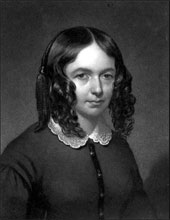Biography of Elizabeth Barrett Browning

Elizabeth Barrett, the first of twelve children, was born on March 6th, 1806 at Coxhoe Hall near Durham, England. Her mother, Mary Graham-Clark, was a wealthy woman of a Newcastle family who gained their riches from a sugar plantation in Jamaica. Her father and mother were married at St. Nicholas, Gosforth in 1805.
As a child, Elizabeth was baptized at Kelloe church, where a plaque is placed today stating "a great poetess, a noble woman, a devoted wife" describing Elizabeth Barrett Browning's life.
For a female at the time, Elizabeth was highly educated. She attended tutoring classes with her younger brother and became very knowledgable of literature and a number of languages; Latin, Greek, French, Italian and Portuguese. Her first poem was published anonymously at the early age of fourteen.
In her mid-teens Elizabeth was struck with illnesses of various diseases. Due to loneliness, loss and frustration caused by her siblings being sent away for education while she, being a female, was faced with numerous limitations. She was affected with measles, spasms, fevers and most notably a lung disease, possibly tuberculosis.
Her family moved to London in 1836. There she would meet the English poet Robert Browning whom she would soon marry. They then moved to Italy and bore a son, Pen Browning.
Elizabeth Barrett Browning died at their home, the Casa Guidi, in Florence, Italy on June 29, 1861. Her body is well preserved and now owned by Eton College. She may now be visited during the summer in Cimitero Degli Inglesi.
Poems by Elizabeth Barrett Browning
Sonnets From the Portuguese (1850)To offer herself privacy, she originally wanted to use the name Sonnets from the Bosnian to make people think they were translations. However, her husband suggested she use Portuguese instead sine his nickname for her was "my little Portuguese."
- I. I Thought Once How Theocritus Had Sung. She wishes to reach new heights.
- III. Unlike Are We, Unlike, O Princely Heart!. She compares herself with her lover.
- VIII. What Can I Give Thee Back, O Liberal. What can she give the man who gives his heart?
- XIV. If Thou Must Love Me, Let It Be for Naught. She describes how she wishes to be loved.
- XXII. When Our Two Souls Stand Up Erect and Strong. The lovers' love is so great.
- XLIII. How Do I Love Thee? Let Me Count the Ways. Her most famous poem.
Other Poetry
- A Musical Instrument. The story of Pan.
- The Best Thing in the World. The many beautiful things nature has to offer.
- Bianca Among the Nightingales. A tragic love poem.
- The Cry of the Children. She argues that children should play like children should.
- Grief. How we deal with death.
- To Flush, My Dog. A metaphor for family and friends.
- The Weakest Thing. God is the only thing permanent.
